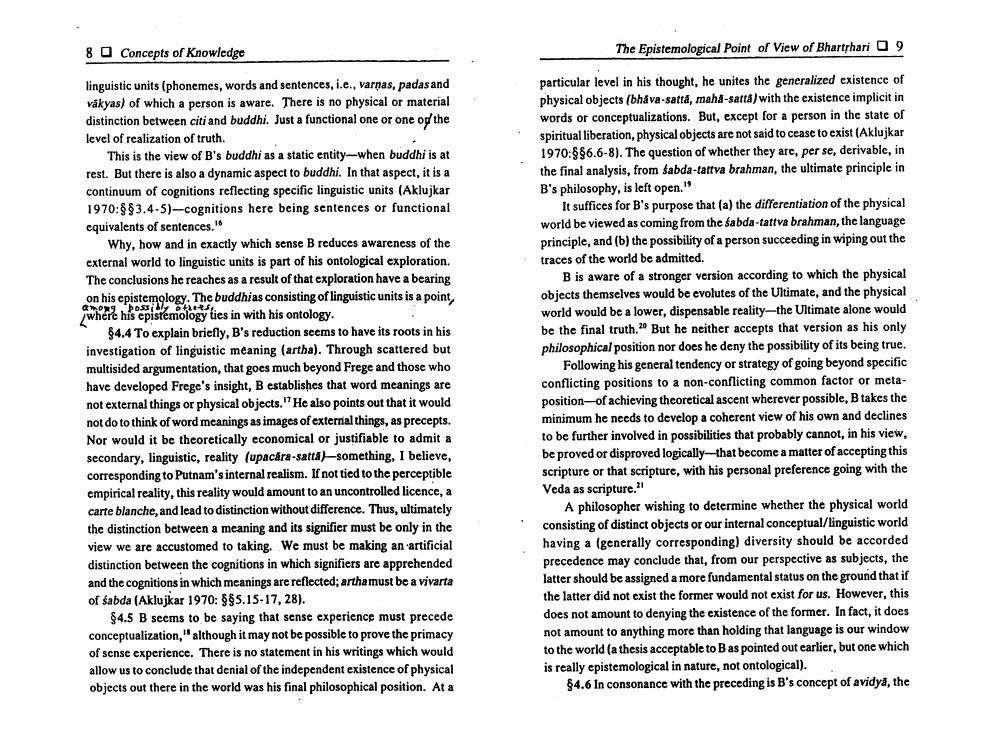Book Title: Epistemological Point Of View Of Bhartrhari Author(s): Ashok Aklujkar Publisher: Ashok Aklujkar View full book textPage 5
________________ 8 O Concepts of Knowledge The Epistemological Point of View of Bharthari 0 9 amorosi, linguistic units (phonemes, words and sentences, i.e., varnas, padas and vakyas) of which a person is aware. There is no physical or material distinction between citi and buddhi. Just a functional one or one od the level of realization of truth. This is the view of B's buddhi as a static entity-when buddhi is at rest. But there is also a dynamic aspect to buddhi. In that aspect, it is a continuum of cognitions reflecting specific linguistic units (Aklujkar 1970:883.4-5)-cognitions here being sentences or functional equivalents of sentences." Why, how and in exactly which sense B reduces awareness of the external world to linguistic units is part of his ontological exploration The conclusions he reaches as a result of that exploration have a bearing on his epistemology. The buddhias consisting of linguistic units is a point, where his epistemology lies in with his ontology. 84.4 To explain briefly, B's reduction seems to have its roots in his investigation of linguistic meaning (artha). Through scattered but multisided argumentation, that goes much beyond Frege and those who have developed Frege's insight, B establishes that word meanings are not external things or physical objects." He also points out that it would not do to think of word meanings as images of external things, as precepts. Nor would it be theoretically economical or justifiable to admit a secondary, linguistic, reality (upacara-satta)-something. I believe, corresponding to Putnam's internal realism. If not tied to the perceptible empirical reality, this reality would amount to an uncontrolled licence, a carte blanche, and lead to distinction without difference. Thus, ultimately the distinction between a meaning and its signifier must be only in the view we are accustomed to taking. We must be making an artificial distinction between the cognitions in which signifiers are apprehended and the cognitions in which meanings are reflected; arthamust be a vivarta of sabda (Aklujkar 1970: $85.15-17, 28). $4.5 В seems to be saying that sense experience must precede conceptualization," although it may not be possible to prove the primacy of sense experience. There is no statement in his writings which would allow us to conclude that denial of the independent existence of physical objects out there in the world was his final philosophical position. At a particular level in his thought, he unites the generalized existence of physical objects (bhava-satta, maha-satta) with the existence implicit in words or conceptualizations. But, except for a person in the state of spiritual liberation, physical objects are not said to cease to exist (Aklujkar 1970:886.6-8). The question of whether they are, per se, derivable, in the final analysis, from $abda-tattva brahman, the ultimate principle in B's philosophy, is left open." It suffices for B's purpose that (a) the differentiation of the physical world be viewed as coming from the sabda-tattva brahman, the language principle, and (b) the possibility of a person succeeding in wiping out the traces of the world be admitted. B is aware of a stronger version according to which the physical objects themselves would be evolutes of the Ultimate, and the physical world would be a lower, dispensable reality-the Ultimate alone would be the final truth. But he neither accepts that version as his only philosophical position nor does he deny the possibility of its being true. Following his general tendency or strategy of going beyond specific conflicting positions to a non-conflicting common factor or metaposition-of achieving theoretical ascent wherever possible, B takes the minimum he needs to develop a coherent view of his own and declines to be further involved in possibilities that probably cannot, in his view, be proved or disproved logically-that become a matter of accepting this scripture or that scripture, with his personal preference going with the Veda as scripture." A philosopher wishing to determine whether the physical world consisting of distinct objects or our internal conceptual/linguistic world having a (generally corresponding) diversity should be accorded precedence may conclude that, from our perspective as subjects, the latter should be assigned a more fundamental status on the ground that if the latter did not exist the former would not exist for us. However, this does not amount to denying the existence of the former. In fact, it does not amount to anything more than holding that language is our window to the world (a thesis acceptable to B as pointed out earlier, but one which is really epistemological in nature, not ontological). $4.6 In consonance with the preceding is B's concept of avidya, thePage Navigation
1 ... 3 4 5 6 7 8 9 10
